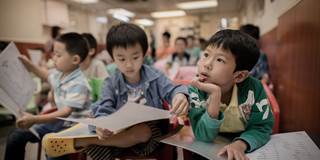Given the effect of human capital on national productive and development capacities, developing countries should be placing a high priority on boosting human capital. The experience of East Asia’s prosperous economies holds valuable lessons.
SEOUL – Nelson Mandela once said, “Education is the most powerful weapon which you can use to change the world.” Education does not just enable individuals to improve their lot in life; it enriches an economy’s human capital, which is vital to prosperity and social progress.
Nowhere is the value of human capital to development more apparent than in East Asia. The top four (of 157) spots in the World Bank’s recently introduced “Human Capital Index” – a composite measure of survival, learning-adjusted years of schooling, and health – are occupied by East Asian economies: Singapore, South Korea, Japan, and Hong Kong.
The new index estimates that a child born today in Singapore will be 88% as productive when she grows up as she could be if she enjoyed complete education and full health. In Sub-Saharan Africa, by contrast, a child will be only 40% as productive. Globally, 57% of all children born today will grow up to be, at best, half as productive as they could be.

SEOUL – Nelson Mandela once said, “Education is the most powerful weapon which you can use to change the world.” Education does not just enable individuals to improve their lot in life; it enriches an economy’s human capital, which is vital to prosperity and social progress.
Nowhere is the value of human capital to development more apparent than in East Asia. The top four (of 157) spots in the World Bank’s recently introduced “Human Capital Index” – a composite measure of survival, learning-adjusted years of schooling, and health – are occupied by East Asian economies: Singapore, South Korea, Japan, and Hong Kong.
The new index estimates that a child born today in Singapore will be 88% as productive when she grows up as she could be if she enjoyed complete education and full health. In Sub-Saharan Africa, by contrast, a child will be only 40% as productive. Globally, 57% of all children born today will grow up to be, at best, half as productive as they could be.